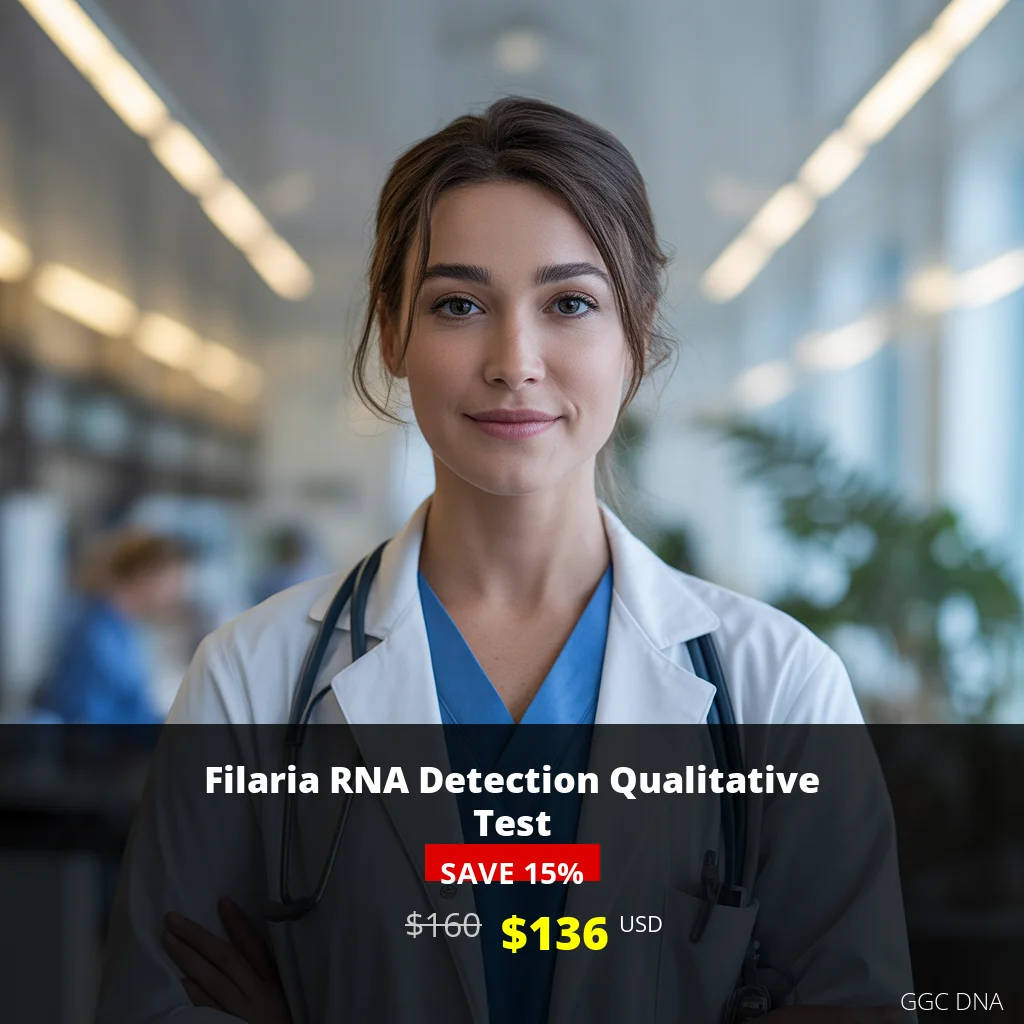Filaria RNA Detection Qualitative Test
Comprehensive Introduction to Filaria RNA Detection
The Filaria RNA Detection Qualitative Test represents a significant advancement in molecular diagnostics for parasitic infections. Utilizing sophisticated Real Time PCR technology, this test provides unparalleled sensitivity in detecting active filarial infections by identifying specific RNA sequences unique to filarial parasites. This cutting-edge approach revolutionizes traditional diagnostic methods by offering earlier detection capabilities and enhanced accuracy in identifying active parasitic presence.
Filarial infections, caused by parasitic worms transmitted through insect bites, can lead to serious health complications if left undiagnosed. Our qualitative RNA detection method represents the gold standard in modern parasitology, providing healthcare providers with reliable diagnostic information crucial for effective treatment planning and disease management strategies.
What the Test Measures and Detects
The Filaria RNA Detection Qualitative Test specifically targets and amplifies filarial RNA sequences through Real Time PCR methodology. This advanced molecular technique enables:
- Detection of active filarial infections through RNA identification
- Qualitative assessment of parasitic presence in blood and tissue samples
- High sensitivity detection even in early infection stages
- Specific identification of filarial species through targeted RNA sequences
- Differentiation between active and resolved infections
Unlike traditional methods that rely on antibody detection or microscopic examination, this RNA-based approach provides direct evidence of active parasitic infection, making it particularly valuable for early diagnosis and treatment monitoring.
Who Should Consider This Test
Clinical Indications and Symptoms
This advanced diagnostic test is recommended for individuals experiencing symptoms or having risk factors associated with filarial infections, including:
- Unexplained recurrent fever episodes
- Lymph node swelling and tenderness
- Skin changes including rashes or nodules
- History of travel to filarial-endemic regions
- Exposure to mosquito bites in high-risk areas
- Family history of parasitic infections
- Unexplained eosinophilia in blood tests
- Symptoms of lymphatic obstruction or inflammation
High-Risk Populations
Individuals with occupational exposure, frequent travelers to tropical regions, military personnel deployed to endemic areas, and residents of filarial-prevalent regions should consider proactive testing for early detection and prevention of complications.
Significant Benefits of Filaria RNA Detection Testing
Choosing the Filaria RNA Detection Qualitative Test provides numerous advantages for comprehensive healthcare management:
- Early Detection Capability: Identifies infections before clinical symptoms become severe
- High Diagnostic Accuracy: Real Time PCR technology ensures reliable results with minimal false positives
- Treatment Guidance: Provides essential information for appropriate antiparasitic therapy selection
- Disease Monitoring: Enables tracking of treatment effectiveness and infection resolution
- Prevention of Complications: Early diagnosis helps prevent long-term lymphatic damage and chronic manifestations
- Public Health Value: Contributes to epidemiological surveillance and infection control efforts
Understanding Your Test Results
Interpretation Guidelines
Your Filaria RNA Detection Qualitative Test results will be clearly categorized to facilitate understanding:
- Positive Result: Indicates detection of filarial RNA, confirming active infection requiring medical consultation and appropriate treatment
- Negative Result: Suggests no detectable filarial RNA at testing time, though clinical correlation with symptoms remains essential
- Indeterminate Result: May require repeat testing or additional diagnostic evaluation for conclusive determination
Clinical Follow-Up
All test results should be discussed with your healthcare provider, who will consider your clinical presentation, exposure history, and additional diagnostic findings to develop an appropriate management plan. Positive results typically warrant antiparasitic treatment and may require additional testing to assess infection extent and organ involvement.
Test Information and Pricing
| Test Parameter | Details |
|---|---|
| Test Name | Filaria RNA Detection Qualitative Test |
| Discount Price | $136 USD |
| Regular Price | $160 USD |
| Turnaround Time | 4th Working Day Email: 48 hours | On Phone: 36 hours |
| Sample Type | Whole Blood, Biopsies |
| Testing Method | Real Time PCR |
| Specialty | Physician, Genetics |
Pre-Test Instructions
To ensure optimal testing conditions and accurate results, please adhere to the following preparation guidelines:
- Complete and sign the required Consent document provided by our facility
- Bring any available clinical history related to filarial infection concerns
- Inform our staff about recent travel history and symptom onset
- Disclose current medications and previous diagnostic testing
- Follow any specific sample collection instructions provided
Nationwide Testing Availability
GGC DNA maintains comprehensive testing facilities across the United States, with convenient locations in all major metropolitan areas including New York, Los Angeles, Chicago, Houston, Phoenix, Philadelphia, San Antonio, San Diego, Dallas, and San Jose. Our nationwide network ensures accessible, reliable diagnostic services with consistent quality standards and rapid result delivery.
Book Your Filaria RNA Detection Test Today
Take proactive control of your health with our advanced Filaria RNA Detection Qualitative Test. Our experienced genetic specialists and advanced laboratory facilities ensure the highest standards of diagnostic accuracy and patient care. Schedule your appointment today to benefit from our discounted pricing at just $136 USD and receive your results within 36-48 hours.
Call or WhatsApp us now at +1(267) 388-9828 to book your test or to speak with our medical professionals about your testing needs. Early detection through advanced molecular diagnostics can make a significant difference in managing filarial infections effectively.



